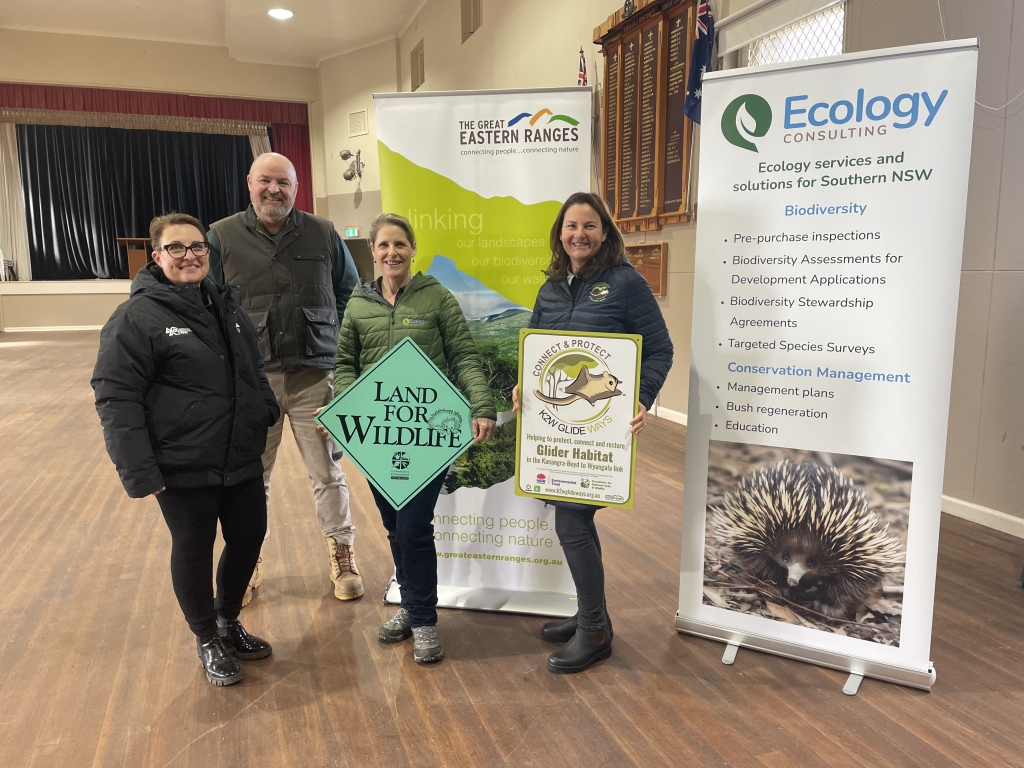
AAC chief executive officer Jo Marshall with Christian Wythes from South East Local Land Services, ecologist Lesley Peden and K2W Link Inc project officer Mary Bonet at the Curraweela bushfire recovery workshop.
A bushfire recovery workshop for landholders impacted by the recent Curraweela bushfire was held on Friday, June 16 at Taralga Memorial Hall, hosted by Upper Lachlan Shire agriculture and conservation organisations, including K2W Link Inc.
The event was organised by the Australian Agricultural Centre (AAC) and aimed to educate landowners and managers affected by the bushfire about the ecology of the landscape after a fire and the support services available to them for recovery and regeneration.
Curraweela is located on the road from Goulburn to Oberon, about 20 kilometres north of Taralga; an area that forms a critical connection for wildlife within the Great Eastern Ranges. In March, the Curraweela bushfire burnt 4437 hectares.
Attendees heard from ecologist Lesley Peden from Ecology Consulting, Christian Wythes from South East Local Land Services and Mary Bonet from the K2W Link Inc who spoke about the range of funding and support available for properties affected by the fire.
The workshop was supported as part of the Great Eastern Ranges Bushfire Local Economic Recovery Fund project funded by the Australian and NSW governments which K2W Link is leading in the region.
The workshop was followed by lunch provided by Grand Ettie, and a tour of affected properties, where the group learned of the experiences and challenges for landholders in the aftermath of the Curraweela bushfire.
K2W Link Inc project officer Mary Bonet said, “It is hard to start talking about restoring habitat for wildlife when people are still trying to get back on their feet after such a devastating event.
“During the tour of the affected properties, we were able to discuss the beginning of the recovery process and explore ways to promote biodiversity alongside productivity to aid in the restoration of the farm, this helped the recovery for the community and the landscape,” she said.
“Landholders were excited about the possibilities for restoring and regenerating their land, which will culminate in linking different parts of the landscape to support indigenous plants and wildlife,” Mrs Bonet said.
After attending the workshop, landowners who have been affected can obtain personalised recovery plans for their properties, which will help kickstart their journey towards restoration and provide access to potential funding resources.
Ecology Consulting is working towards developing a bushfire recovery planting guide for the Taralga region.
Ms Peden said there are many different approaches for managing revegetation after a bushfire and preparing zones that support the natural assets for the ecosystem to function.
“Ecosystems are also in agricultural landscapes either functioning or non-functioning and things like a catastrophic bushfire will put them into complete chaos. Living in a farming landscape, there’s a balance between forest, grassland and woodlands, and we want to achieve a balance.
“The functioning ecosystem is at the heart of all of it,” she said.
A Hotspots workshop is currently being planned for the region to help landholders prepare for future bushfires.
